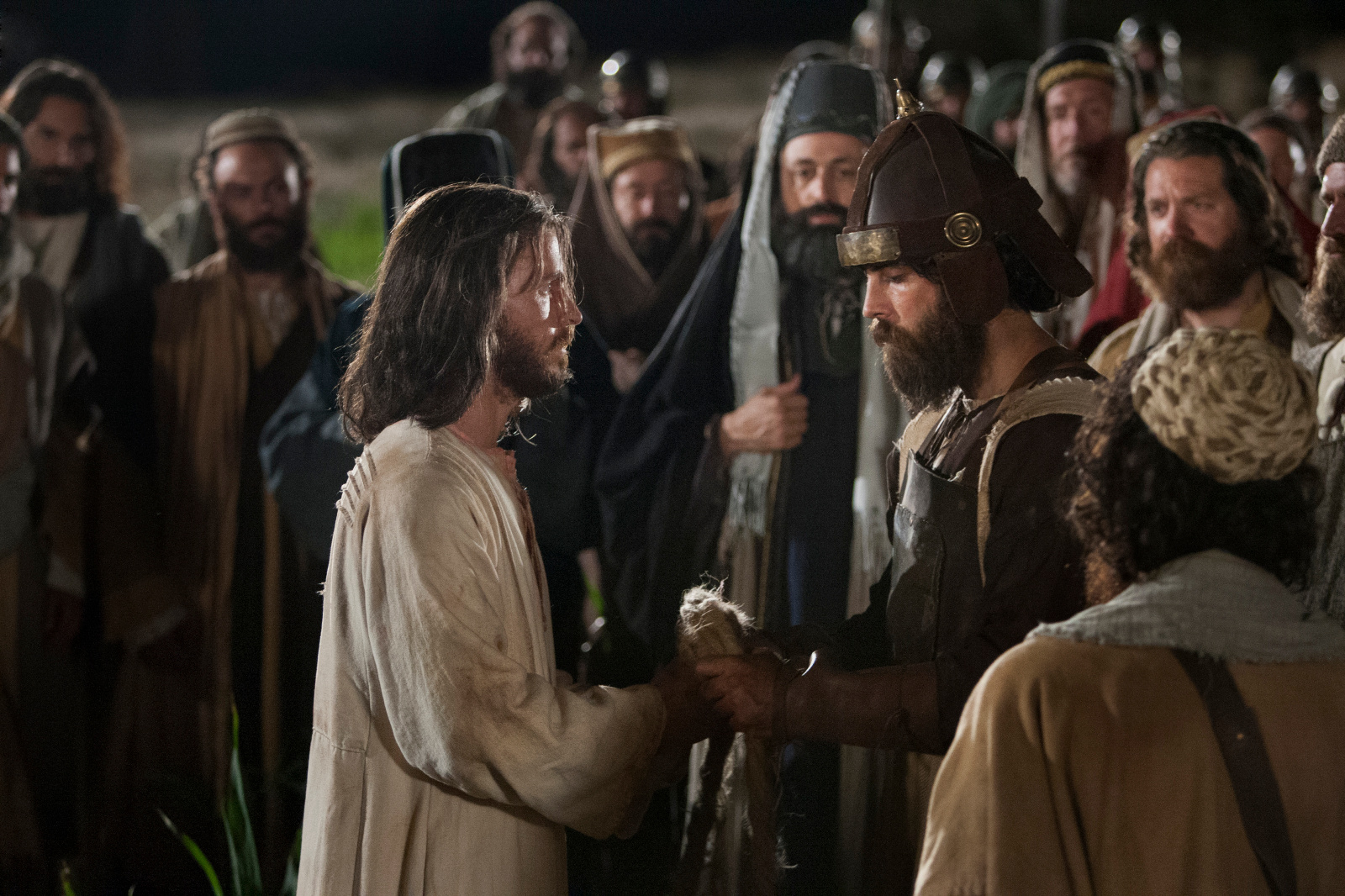 The fix is in. The Sanhedrin (the 70-member Jewish Supreme Court) holds all the cards. Jesus doesn’t have a chance. After arresting him that night at Gethsemane . . .
The fix is in. The Sanhedrin (the 70-member Jewish Supreme Court) holds all the cards. Jesus doesn’t have a chance. After arresting him that night at Gethsemane . . .
They took Jesus to the high priest, and all the chief priests, elders and teachers of the law came together. Peter followed him at a distance, right into the courtyard of the high priest. There he sat with the guards and warmed himself at the fire (Mark 14:53,54).
The first hint the fix is in: instead of taking Jesus to the temple (where trials were normally held), they take him to the high priest’s house (Peter follows them “into the courtyard of the high priest”).
The second: looks like Sanhedrin members were ready to come at a moment’s notice in the middle of the night.
According to Mark, the third is no hint at all . . .
The chief priests and the whole Sanhedrin were looking for evidence against Jesus so that they could put him to death, but they did not find any. Many testified falsely against him, but their statements did not agree. Then some stood up and gave this false testimony against him: “We heard him say, ‘I will destroy this man-made temple and in three days will build another, not made by man.'” Yet even then their testimony did not agree (Mark 14:55-59).
The fix-hints are piling up. Take the matter of Jewish law. It required a minimum of two independent eyewitnesses whose testimony agreed in every detail. Mark (probably getting this information from two Court members who followed Jesus—Nicodemus and Joseph of Arimethea) reports . . .
“Many testified falsely against him, but their statements did not agree.” It’s starting to look like the Keystone Cops. No two could get their stories straight.
So the court apparently had their witnesses lined up, but somebody dropped the ball when it came to coaching them. There were other “witnesses” who claimed they heard Jesus plan to destroy the temple—a serious charge since the whole Roman world considered destroying a place of worship a death-penalty crime. But, as before, the charge didn’t stick: one said Jesus planned to burn it, another that he would tear it down with bare hands (or something like that). No agreement; no credible witness.
Can’t you see the high-priest’s red face? His blood pressure’s rising to the red zone. What kind of idiots are these “witnesses”? Everything had gone so well. They had Jesus. But now they can’t even find two schmucks who can tell the same story! He’ll have to do it himself . . .
Then the high priest stood up before them and asked Jesus, “Are you not going to answer? What is this testimony that these men are bringing against you?”But Jesus remained silent and gave no answer. Again the high priest asked him, “Are you the Christ, the Son of the Blessed One?” (Mark 14:60,61).
To be acquitted Jesus had to answer charges against him. But Jesus knew the charges were fabricated. He was innocent. The sure-thing trial had crumbled into an embarrassing fiasco. The high priest shot his strongest salvo: “Are you the Christ, the Son of the Blessed One?” This one Jesus answered . . .
“I am,” said Jesus. “And you will see the Son of Man sitting at the right hand of the Mighty One and coming on the clouds of heaven” (Mark 14:62).
I’m guessing several seconds of silence reigned with not a few mouths hanging wide. He was calling himself Messiah according to prophecies like , , ,
“In my vision at night I looked, and there before me was one like a son of man, coming with the clouds of heaven. He approached the Ancient of Days and was led into his presence. He was given authority, glory and sovereign power; all peoples, nations and men of every language worshiped him. His dominion is an everlasting dominion that will not pass away, and his kingdom is one that will never be destroyed (Daniel 7:13,14).
The LORD says to my Lord: “Sit at my right hand until I make your enemies a footstool for your feet” (Psalm 110:1).
Then, the instant it all sunk in . . .
The high priest tore his clothes. “Why do we need any more witnesses?” he asked. “You have heard the blasphemy. What do you think?” They all condemned him as worthy of death. Then some began to spit at him; they blindfolded him, struck him with their fists, and said, “Prophesy!” And the guards took him and beat him (Mark 14:63-65).
Meanwhile, Peter is doing precisely what Jesus predicted–what Peter vehemently dismissed . . .
While Peter was below in the courtyard, one of the servant girls of the high priest came by. When she saw Peter warming himself, she looked closely at him. “You also were with that Nazarene, Jesus,” she said. But he denied it. “I don’t know or understand what you’re talking about,” he said, and went out into the entryway. When the servant girl saw him there, she said again to those standing around, “This fellow is one of them.” Again he denied it. After a little while, those standing near said to Peter, “Surely you are one of them, for you are a Galilean.” He began to call down curses on himself, and he swore to them, “I don’t know this man you’re talking about.” Immediately the rooster crowed the second time. Then Peter remembered the word Jesus had spoken to him: “Before the rooster crows twice you will disown me three times.” And he broke down and wept (Mark 14:66-72).
Despite our promises how weak we are! And how merciful Jesus is! After resurrection, the angel specifically names Peter as one disciple Jesus wants to welcome back (Mark 15:7). For now, Peter weeps.
* * * * *
Here’s the compelling question: Just who’s on trial here? Clearly Jesus. He stood bound and accused and finally condemned before the Jewish authorities. I suggest, though less clearly, it was the Sanhedrin members who voted Jesus worthy of death.
This was their last, official opportunity to acquit Jesus. They knew his miracles and teachings. They knew the witnesses offered fabricated testimony. They knew Jesus was claiming to be the Messiah based on Scripture. Nothing he had done proved any different. The high priest was actually obligated to recognize Jesus as Israel’s Messiah. Yet in their pride and greed they incited each other to a guilty verdict and actually beat him. At his Coming, Jesus will stand in judgment over them.
We assume, when we hear the Gospel, that we evaluate Jesus, that we sit on the judge’s bench and Jesus in the defendant’s chair. But in reality, Jesus judges us. What he decides is truly a life-or-death matter. We’d better understand just who’s on trial here.





 When you hear of wars and rumors of wars, do not be alarmed. Such things must happen, but the end is still to come. Nation will rise against nation, and kingdom against kingdom. There will be earthquakes in various places, and famines. These are the beginning of birth pains (13:5-8).
When you hear of wars and rumors of wars, do not be alarmed. Such things must happen, but the end is still to come. Nation will rise against nation, and kingdom against kingdom. There will be earthquakes in various places, and famines. These are the beginning of birth pains (13:5-8). those days for pregnant women and nursing mothers! Pray that this will not take place in winter, because those will be days of distress unequaled from the beginning, when God created the world, until now– and never to be equaled again. If the Lord had not cut short those days, no one would survive. But for the sake of the elect, whom he has chosen, he has shortened them. At that time if anyone says to you, ‘Look, here is the Christ!’ or, ‘Look, there he is!’ do not believe it. For false Christs and false prophets will appear and perform signs and miracles to deceive the elect– if that were possible. So be on your guard; I have told you everything ahead of time” (13:14-23).
those days for pregnant women and nursing mothers! Pray that this will not take place in winter, because those will be days of distress unequaled from the beginning, when God created the world, until now– and never to be equaled again. If the Lord had not cut short those days, no one would survive. But for the sake of the elect, whom he has chosen, he has shortened them. At that time if anyone says to you, ‘Look, here is the Christ!’ or, ‘Look, there he is!’ do not believe it. For false Christs and false prophets will appear and perform signs and miracles to deceive the elect– if that were possible. So be on your guard; I have told you everything ahead of time” (13:14-23). However . . .
However . . .
Recent Comments